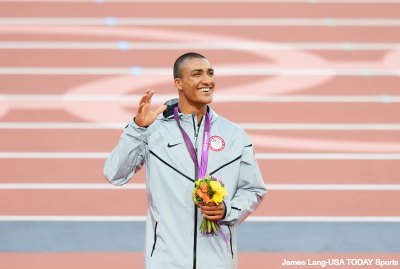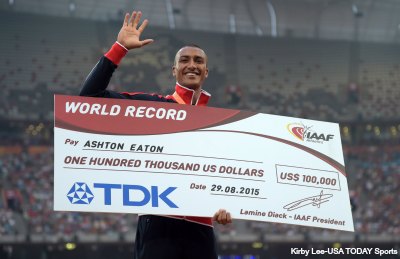Ashton Eaton is a decathlete -- an Olympian who divides his time and training among 10 different events. You'd think there'd be no time for anything else.
And it's true, to an extent: Being an Olympic-level athlete -- much less a reigning gold medalist from 2012, like Eaton is -- demands physical, mental, and emotional excellence.
But there's more to being an Olympian than just training hard and preparing for that moment in the spotlight. With the Games still several months away, athletes are starting to hit the promotional trail and talk about their journey.
It's a fun experience, sure, but the savviest understand it's something much more: Interviews, experiences, and other moments in the spotlight are an opportunity to build a brand, and an interested audience.

Some athletes are naturals at it, while others are more comfortable competing. but in Eaton's view, those trends are shifting: Athletes are getting better at taking control of their own personal narratives.
"And I'm wondering if it's because it's just the age we're in," Eaton says. "In 2012, maybe it was a little bit different, but I think nowadays people in general understand that there's broader stories behind the athletes they see on TV."
But exactly why are audiences and athletes getting more savvy? Eaton credits social media. Through Twitter, Facebook, Snapchat and other channels, Eaton and his fellow Olympians take an active, front-and-center role in telling their stories, publishing their own content and engaging with fans.
Fans, meanwhile, have direct channels to experience those athletes and their stories. They've come to expect that sort of direct engagement. And with a generation of Olympians who have grown up on social media, that type of storytelling is more organic and intuitive.
There's a business side to it, though, too. For athletes like Eaton, who compete in sports that don't exactly draw riches by the multi-millions, personal narratives are a critical asset. Sports fans are drawn to stories, and by generating interest as a person -- as well as an Olympian -- athletes can build a foundation for financial success, too.

Success in competition is important -- Eaton has become a popular Olympian, first and foremost, because he holds the world record in the decathlon, and is a defending gold medalist for Team USA. But because he's also a high-character athlete who used track and field as a way to get to college when his family couldn't afford to send him on their own, he's also become a role model.
That's why companies like Coca-Cola, Visa and now Gillette have chosen to sign Eaton to endorsement deals. And through those partnerships, Eaton is able to help shape his own story.
"You get approached by sponsors, and there's just campaigns they want to run and the stories they want to tell, and you get a choice," Eaton says. He's explaining his new "Perfect Isn't Pretty" campaign with Gillette, which shines a light on the hard work and suffering that happens behind-the-scenes, months and years before the Olympics arrive.
"[Myself and Gillette] are kind of looking to tell a parallel narrative. We both have goals, and the path to those goals isn't always pretty, it's rough.
"I think it's what people should be seeing or hearing. Even if you see a great performance, it's not always great getting there. There are injuries. ... Intrinsically or unconsciously, people understand that -- people see those performances and they know there are stories behind that."
That's the rub of being a world-class athlete and the person in charge of controlling your story: Olympians like Eaton have a lot on their plate. But Eaton says he doesn't struggle with juggling the various commitments, in part because it's similar to how we all manage our presences today.
Anyone with a social media presence is dedicating time to shape their reputation and story online. Some of the habits of storytelling have become second-nature in our society. And while Eaton's training schedule is demanding -- he struggles to describe the complexity of his routine, which requires striking a balance in training for 10 distinct events -- there's still time in the day to take an active role in how the public perceives him.
But as the 2016 Summer Olympics approach, he doesn't want that daily grind to go forgotten.
"There's no solid data on how to do it right," Eaton says of training for the decathlon. "It's just constant adjustments."
You could say the same for today's style of self-promotion.





